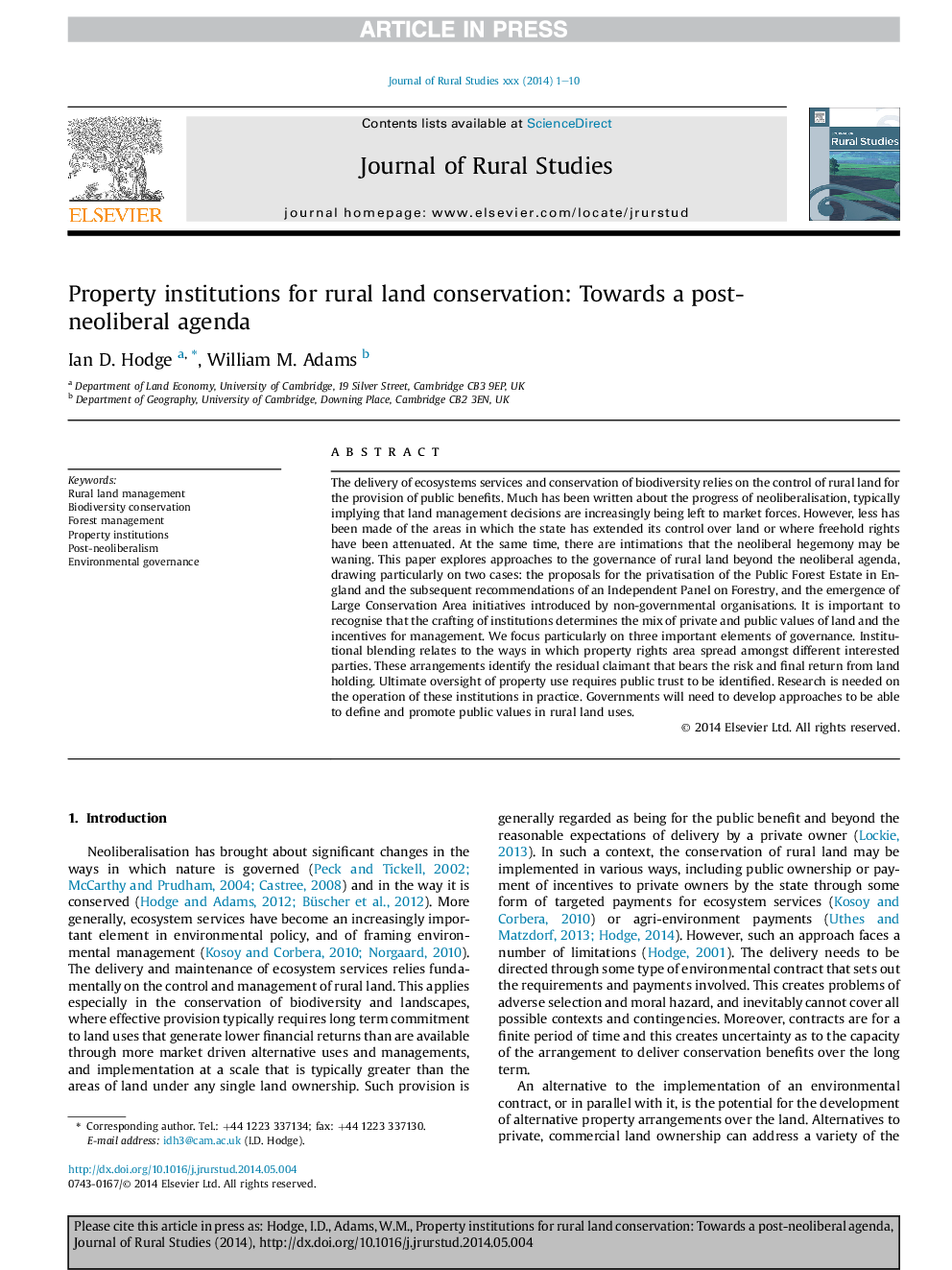| کد مقاله | کد نشریه | سال انتشار | مقاله انگلیسی | نسخه تمام متن |
|---|---|---|---|---|
| 6545790 | 159972 | 2014 | 10 صفحه PDF | دانلود رایگان |
عنوان انگلیسی مقاله ISI
Property institutions for rural land conservation: Towards a post-neoliberal agenda
ترجمه فارسی عنوان
موسسات املاک برای حفظ محیط زیست روستایی: به سوی دستور کار پس از نئولیبرال
دانلود مقاله + سفارش ترجمه
دانلود مقاله ISI انگلیسی
رایگان برای ایرانیان
کلمات کلیدی
مدیریت زمین روستایی، حفاظت از تنوع زیستی، مدیریت جنگل، موسسات املاک، پس از نئولیبرالیسم، حکومتداری محیط زیست،
ترجمه چکیده
تحویل خدمات اکوسیستم و حفاظت از تنوع زیستی متکی بر کنترل زمین روستایی برای تأمین مزایای عمومی است. در مورد پیشرفت نئولیبرالیزاسیون زیاد نوشته شده است، که عمدتا به این معنی است که تصمیمات مدیریت زمین به طور فزاینده ای به نیروهای بازار منتهی می شود. با این حال، کمتر از مناطق که در آن دولت کنترل خود را بر زمین است و یا در آن حقوق محروم شده است کاهش یافته است ساخته شده است. در عین حال، اعتقادی وجود دارد که هژمونی نئولیبرالی ممکن است کاهش یابد. این مقاله به بررسی رویکردهای حاکمیت زمین های روستایی فراتر از دستور کار نئولیبرال می پردازد، به ویژه در مورد دو مورد: طرح خصوصی سازی املاک عمومی در انگلستان و توصیه های بعدی یک هیئت مستقل در جنگلداری و ظهور حفاظت بزرگ ابتکارات منطقه ای توسط سازمان های غیردولتی معرفی شده است. مهم است که شناخت داشته باشیم که ساختن نهاد ها ترکیبی از ارزش های خصوصی و عمومی زمین و انگیزه های مدیریت را تعیین می کند. ما به طور خاص بر سه عنصر مهم حکومت تمرکز می کنیم. ترکیب سازمانی مربوط به شیوه هایی است که در آن منطقه حقوق مالکیت در بین اشخاص متفاوتی گسترش یافته است. این توافقنامه، متقاضی باقی مانده را شناسایی می کند که خطر و بازده نهایی را از مالکیت زمین به عهده دارد. نظارت نهایی بر استفاده از اموال نیازمند شناخت اعتماد عمومی است. در عمل این موسسات تحقیقاتی مورد نیاز است. دولت ها باید رویکردهایی را برای تعریف و ارتقاء ارزش های عمومی در استفاده از زمین های روستایی ایجاد کنند.
موضوعات مرتبط
علوم زیستی و بیوفناوری
علوم کشاورزی و بیولوژیک
جنگلداری
چکیده انگلیسی
The delivery of ecosystems services and conservation of biodiversity relies on the control of rural land for the provision of public benefits. Much has been written about the progress of neoliberalisation, typically implying that land management decisions are increasingly being left to market forces. However, less has been made of the areas in which the state has extended its control over land or where freehold rights have been attenuated. At the same time, there are intimations that the neoliberal hegemony may be waning. This paper explores approaches to the governance of rural land beyond the neoliberal agenda, drawing particularly on two cases: the proposals for the privatisation of the Public Forest Estate in England and the subsequent recommendations of an Independent Panel on Forestry, and the emergence of Large Conservation Area initiatives introduced by non-governmental organisations. It is important to recognise that the crafting of institutions determines the mix of private and public values of land and the incentives for management. We focus particularly on three important elements of governance. Institutional blending relates to the ways in which property rights area spread amongst different interested parties. These arrangements identify the residual claimant that bears the risk and final return from land holding. Ultimate oversight of property use requires public trust to be identified. Research is needed on the operation of these institutions in practice. Governments will need to develop approaches to be able to define and promote public values in rural land uses.
ناشر
Database: Elsevier - ScienceDirect (ساینس دایرکت)
Journal: Journal of Rural Studies - Volume 36, October 2014, Pages 453-462
Journal: Journal of Rural Studies - Volume 36, October 2014, Pages 453-462
نویسندگان
Ian D. Hodge, William M. Adams,
